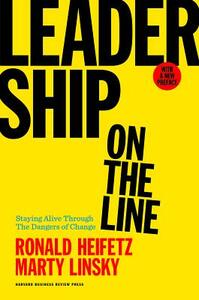You need to sign in or sign up before continuing.
Take a photo of a barcode or cover
22 reviews for:
Leadership on the Line: Staying Alive Through the Dangers of Change
Marty Linsky, Ronald A. Heifetz
22 reviews for:
Leadership on the Line: Staying Alive Through the Dangers of Change
Marty Linsky, Ronald A. Heifetz
Solid thoughts and examples. Spiritual stuff at end was weak compared to dedicated books on the topic, but a good way to cap everything off.
I'm not quite sure where to place this book. At least three stars, but could be four.
I picked it up expecting a treatise on leadership. I'm not sure if I was expecting tips like the Jack Welch thank-you-notes or the Peter Drucker schedule management; or if I was expecting inspiration, vision, or philosophy, or what. What I got was completely unexpected.
The first part of the book provides practical tips for leading successful change in organizations. Not what I was expecting as leadership, but exactly the sort of thing I'm expected to do with clients on a regular basis. The incredibly interesting thing is that it approached this influence from a political angle. Many of the types of influence and change books I read deal with interpersonal influence, but Leadership on the Line talked in broader terms about groups and interests and consequences. I found it hugely valuable.
The second part of the book talks about the emotional/spiritual part of leadership. How to deal with being attacked, how to deal with the pressures, how to remain open to ideas, how to keep inspiring. It seemed useful, I guess, but I was much less enamored of it. It just didn't resonate with me the way the first part of the book did, especially when the authors invoke religion. I understand that religion provides a spiritual haven for many people and very much deserves mention. It just wasn't for me.
One thing I should mention: there's a chapter called Manage Your Hungers that discusses how our normal human needs can be amplified when we're under stress, and can undermine our leadership and change efforts. There are sections on power and control; affirmation and importance; and intimacy and delight. The intimacy and delight section, as you might expect, deals with sexual relationships (using Bill Clinton as an example). While the points are good, the frank talk about sex makes me slightly reluctant to recommend this book to my colleagues as it veers into areas I'm not comfortable discussing in a work setting. That said, it's valuable stuff to think about, and good advice.
This was a unique way of thinking about change, influence, and leadership, and I'm glad I read it. I wish I liked the latter chapters more, however it's likely that others will see more value in them than I do.
I picked it up expecting a treatise on leadership. I'm not sure if I was expecting tips like the Jack Welch thank-you-notes or the Peter Drucker schedule management; or if I was expecting inspiration, vision, or philosophy, or what. What I got was completely unexpected.
The first part of the book provides practical tips for leading successful change in organizations. Not what I was expecting as leadership, but exactly the sort of thing I'm expected to do with clients on a regular basis. The incredibly interesting thing is that it approached this influence from a political angle. Many of the types of influence and change books I read deal with interpersonal influence, but Leadership on the Line talked in broader terms about groups and interests and consequences. I found it hugely valuable.
The second part of the book talks about the emotional/spiritual part of leadership. How to deal with being attacked, how to deal with the pressures, how to remain open to ideas, how to keep inspiring. It seemed useful, I guess, but I was much less enamored of it. It just didn't resonate with me the way the first part of the book did, especially when the authors invoke religion. I understand that religion provides a spiritual haven for many people and very much deserves mention. It just wasn't for me.
One thing I should mention: there's a chapter called Manage Your Hungers that discusses how our normal human needs can be amplified when we're under stress, and can undermine our leadership and change efforts. There are sections on power and control; affirmation and importance; and intimacy and delight. The intimacy and delight section, as you might expect, deals with sexual relationships (using Bill Clinton as an example). While the points are good, the frank talk about sex makes me slightly reluctant to recommend this book to my colleagues as it veers into areas I'm not comfortable discussing in a work setting. That said, it's valuable stuff to think about, and good advice.
This was a unique way of thinking about change, influence, and leadership, and I'm glad I read it. I wish I liked the latter chapters more, however it's likely that others will see more value in them than I do.
